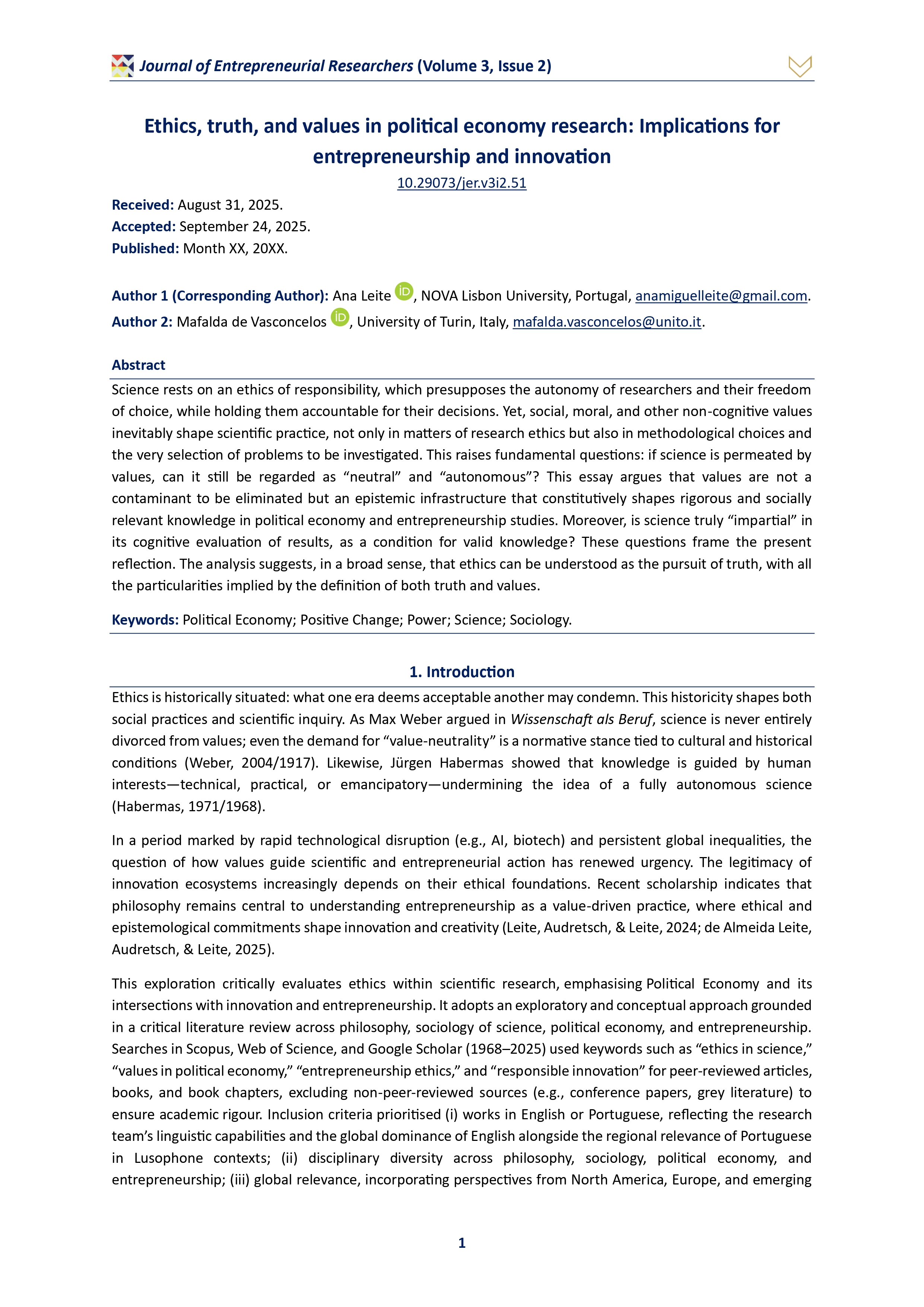Ethics, truth, and values in political economy research: Implications for entrepreneurship and innovation
DOI:
https://doi.org/10.29073/jer.v3i2.51Keywords:
Political Economy, Positive Change, Power, Science, SociologyAbstract
Science rests on an ethics of responsibility, which presupposes the autonomy of researchers and their freedom of choice, while holding them accountable for their decisions. Yet, social, moral, and other non-cognitive values inevitably shape scientific practice, not only in matters of research ethics but also in methodological choices and the very selection of problems to be investigated. This raises fundamental questions: if science is permeated by values, can it still be regarded as “neutral” and “autonomous”? This essay argues that values are not a contaminant to be eliminated but an epistemic infrastructure that constitutively shapes rigorous and socially relevant knowledge in political economy and entrepreneurship studies. Moreover, is science truly “impartial” in its cognitive evaluation of results, as a condition for valid knowledge? These questions frame the present reflection. The analysis suggests, in a broad sense, that ethics can be understood as the pursuit of truth, with all the particularities implied by the definition of both truth and values.Downloads
References
Audretsch, D. B. (2009). The entrepreneurial society. The Journal of Technology Transfer, 34(3), 245–254. https://doi.org/10.1007/s10961-008-9101-3
Audretsch, D., & Link, A. N. (2018). Sources of knowledge and entrepreneurial behavior. University of Toronto Press. https://doi.org/10.3138/9781487512538
Aymoré, D., & Ferreira da Cunha, I. (2021). Introdução à edição especial ciência e valores: A interação entre ciência, tecnologia e sociedade. NEL—Epistemology and Logic Research Group, Federal University of Santa Catarina (UFSC), Brasil.
Blanchard, K. H., & Peale, N. V. (1988). The power of ethical management (1st ed.). W. Morrow. https://archive.org/details/powerofethicalma0000blan
Brown, M. (2021). Science and moral imagination: A new ideal for values in science. University of Pittsburgh Press.
Bunge, M. (Ed.). (1999). Critical approaches to science and philosophy (1st ed.). Routledge. https://doi.org/10.4324/9781351313087
Chirat, A. (2018). When Galbraith frightened conservatives: Power in economics, economists’ power, and scientificity. Journal of Economic Issues, 52(1), 31–56. https://doi.org/10.1080/00213624.2018.1430940
Costa Gomes, C. (2023). Eurythmy of ethics and happiness in entrepreneurship. Journal of Entrepreneurial Researchers, 1(2), 71–80. https://doi.org/10.29073/jer.v1i2.15
Costa Gomes, C. (2025). Reconfiguring informed consent in the age of artificial intelligence: Bioethical and normative challenges in digital health. Journal of Entrepreneurial Researchers, 3(1), 27–43. https://doi.org/10.29073/jer.v3i1.41
Cupani, A. (2021). Science and values, once again: On the incorporation of non-epistemic values in scientific practices. NEL—Epistemology and Logic Research Group, Federal University of Santa Catarina (UFSC).
Dacin, M. T., Dacin, P. A., & Tracey, P. (2011). Social entrepreneurship: A critique and future directions. Organization Science, 22(5), 1203–1213. https://doi.org/10.1287/orsc.1100.0620
Dasgupta, P. (2009). Facts and values in modern economics. In H. Kincaid & D. Ross (Eds.), The Oxford handbook of philosophy of economics (pp. 580–640). Oxford University Press.
de Almeida Leite, E. M., Audretsch, D., & Leite, A. (2025). Integrating philosophy and psychology to enhance creativity and innovation in entrepreneurship: The W.O.M.B. model. The Journal of Technology Transfer, 50(5), 1396–1415. https://doi.org/10.1007/s10961-024-10142-1
De Assis Dias, E. (2021). Ciência e ética em Popper: A ética da responsabilidade dos cientistas. Trans/Form/Ação, 44(3), 81–100.
Douglas, H. (2009). Science, policy, and the value-free ideal. University of Pittsburgh Press.
Galbraith, J. K. (1958). The affluent society. Houghton Mifflin.
Graça, J. C., Caiado, J., & Gomes Correia, R. (2020). Sociopolitical values, attitudes and behaviors of Portuguese economics students. Sociologia, Problemas e Práticas, 92, 111–132. https://doi.org/10.7458/SPP20209213699
Habermas, J. (1971). Knowledge and human interests (J. J. Shapiro, Trans.). Beacon Press. (Original work published 1968)
Holjevac, I. A. (2002). Quality management in tourism and hotel industry. Faculty of Tourism and Hospitality Management.
Holjevac, I. A. (2008). Business ethics in tourism – As a dimension of TQM. Total Quality Management & Business Excellence, 19(10), 1029–1041. https://doi.org/10.1080/14783360802264103
Kincaid, H., Dupré, J., & Wylie, A. (2007). Value-free science? Ideals and illusions. Oxford University Press.
Kitcher, P. (2001). Science, truth, and democracy. Oxford University Press.
Lacey, H. (1998). Valores e atividade científica. Discurso.
Lacey, H. (1999). Is science value free? Values and scientific understanding. Routledge.
Lacey, H. (2005). Como devem os valores influenciar a ciência? Filosofia Unisinos, 6(1), 41–54.
Leite, E. M. de A., Audretsch, D., & Leite, A. (2024). Redefining entrepreneurship: Philosophical insights in a post-individualist era. The Journal of Entrepreneurship, 33(2), 239–267. https://doi.org/10.1177/09713557241255399
Longino, H. (1990). Science as social knowledge: Values and objectivity in scientific inquiry. Princeton University Press.
Longino, H. (2002). The fate of knowledge. Princeton University Press.
Marques, A., & Cadilha, S. (2019). Wittgenstein sobre ética. IFILNOVA – NOVA FCSH.
Martins, N. (2019). Ética e economia no mundo contemporâneo. In S. L. Coelho & G. Marcelo (Eds.), Ética, economia e sociedade: Questões cruzadas (pp. 36–46). Universidade Católica Editora.
Marx, K., & Engels, F. (2007). A ideologia alemã (3rd ed., L. C. de Castro e Costa, Trans.). Martins Fontes.
Neves, V. (2019). Ciência, valores e política: Como os economistas têm vindo a pensar a economia em Portugal. In V. Neves & J. Reis (Orgs.), A ciência económica em Portugal: Uma história recente (pp. 183–221). Edições Almedina.
Parks-Leduc, L., Mulligan, L., & Rutherford, M. A. (2021). Can ethics be taught? Examining the impact of distributed ethical training and individual characteristics on ethical decision-making. Academy of Management Learning & Education, 20(1), 30–49. https://doi.org/10.5465/amle.2018.0157
Popper, K. (2002). The logic of scientific discovery (2nd ed.). Routledge. https://doi.org/10.4324/9780203994627
Shepherd, D. A. (2015). Party on! A call for entrepreneurship research that is more interactive, activity based, cognitively hot, compassionate, and prosocial. Journal of Business Venturing, 30(4), 489–507. https://doi.org/10.1016/j.jbusvent.2015.02.001
Stilgoe, J., Owen, R., & Macnaghten, P. (2013). Developing a framework for responsible innovation. Research Policy, 42(9), 1568–1580. https://doi.org/10.1016/j.respol.2013.05.008
Weber, M. (1917). Wissenschaft als Beruf. Duncker & Humblot.
Weber, M. (2004). The vocation lectures: “Science as a vocation” and “Politics as a vocation” (D. Owen & T. B. Strong, Eds.; R. Livingstone, Trans.). Hackett. (Original work published 1917)
Zahra, S. A., & Wright, M. (2016). Understanding the social role of entrepreneurship. Journal of Management Studies, 53(4), 610–629. https://doi.org/10.1111/joms.12149

Downloads
Published
How to Cite
Issue
Section
License
Copyright (c) 2025 Journal of Entrepreneurial Researchers

This work is licensed under a Creative Commons Attribution 4.0 International License.






